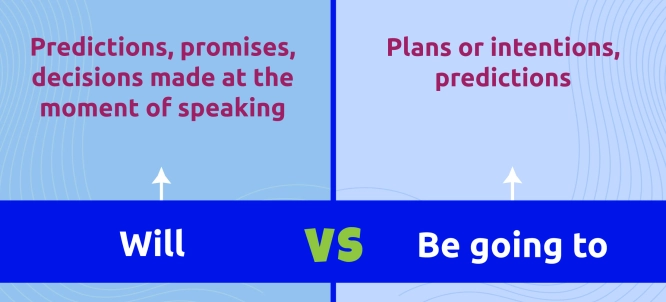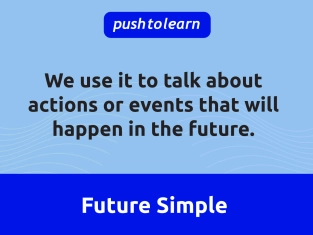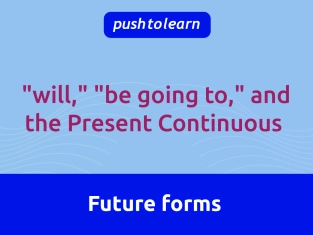by PushtoLearn
Will vs Be going to
Table of Contents
Will vs Be going to - Exercises
These exercises focus on Will vs Be going to
1. Using "Will"
"Will" is used for:
-
Decisions made at the moment of speaking
-
Predictions based on thoughts or beliefs
-
Promises and offers
Structure:
-
Subject + will + base form of the verb
Examples of "Will":
-
For decisions made now:
-
"I'm thirsty. I will get a glass of water."
-
"I don’t have enough money. I will borrow some from my friend."
-
For predictions (based on opinion or belief):
-
"I think it will rain tomorrow."
-
"She will be a great teacher someday."
-
For promises and offers:
-
"I will help you with your homework."
-
"Don’t worry, I will pick you up after school."

2. Using "Be Going to"
"Be going to" is used for:
-
Plans or intentions that have already been decided
-
Predictions based on present evidence (something you see or know now)
Structure:
-
Subject + am/is/are + going to + base form of the verb
Examples of "Be Going to":
-
For plans and intentions:
-
"We are going to visit grandma next weekend."
-
"She is going to study medicine at college."
-
For predictions (based on evidence):
-
"Look at those clouds! It is going to rain."
-
"He is going to be late; he just left the house."
Comparing "Will" and "Be Going to"
|
Use |
Will |
Be Going to |
|
Decision made now |
"I’m tired. I will take a nap." |
X (not used for immediate decisions) |
|
Future plans/intentions |
X (not usually used) |
"We are going to visit the zoo tomorrow." |
|
Predictions |
"I think she will pass the test." |
"She studied a lot, so she is going to pass the test." |
|
Promises/Offers |
"I will help you with that." |
X (not used for promises or offers) |
Examples in Context
-
Will:
-
Decision: "I forgot to bring lunch. I will buy something from the cafeteria."
-
Prediction: "Don’t worry; you will do great on your exam."
-
Promise: "I will call you when I get home."
-
Be Going to:
-
Plan: "We are going to travel to Spain this summer."
-
Prediction based on evidence: "The sky is dark. It is going to storm soon."
Have a look at the lesson about Future Simple and Future forms for more options to talk about future actions.
When to Use "Will" vs. "Be Going to"
-
Use "will" for:
-
Decisions made at the moment of speaking.
-
Predictions based on belief, not necessarily with present evidence.
-
Offers, promises, and suggestions.
-
Use "be going to" for:
-
Plans or intentions that have been decided before the moment of speaking.
-
Predictions based on something you see or know now.
FAQ
Can "will" be used for predictions?
Yes! Use "will" for predictions based on beliefs or opinions (e.g., "I think she will win the contest").
When is it better to use "be going to"?
Use "be going to" for predictions based on evidence (e.g., "Look at those clouds; it is going to rain") and for plans you made before speaking.
Is "will" more formal than "be going to"?
No, both are commonly used in spoken and written English, but they have different uses rather than one being more formal.
Can "will" and "be going to" be used interchangeably?
Not usually, since each has its own specific uses. However, in casual conversation, people sometimes mix them up, especially with predictions.
Do we use "will" or "be going to" with promises?
"Will" is usually used for promises (e.g., "I will be there on time").

